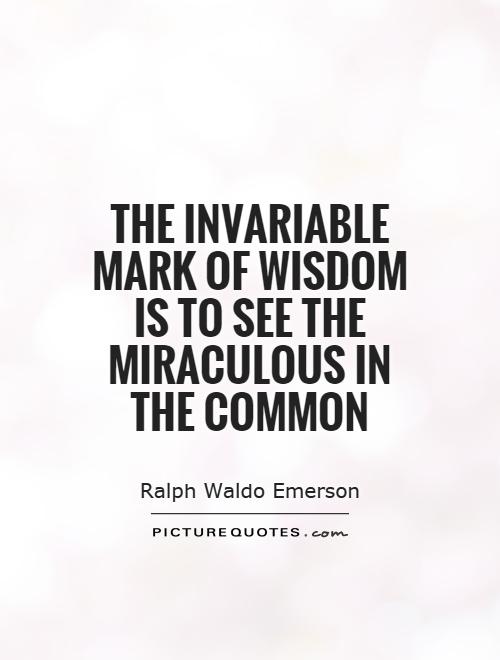The invariable mark of wisdom is to see the miraculous in the common

The invariable mark of wisdom is to see the miraculous in the common
Ralph Waldo Emerson, a renowned American essayist, lecturer, and poet, was a firm believer in the power of wisdom and the importance of seeing the miraculous in the common. Throughout his works, Emerson emphasized the idea that true wisdom lies in the ability to appreciate the beauty and wonder of everyday life, rather than seeking out grand and extraordinary experiences.Emerson believed that the key to living a fulfilling and meaningful life was to cultivate a sense of wonder and awe in the ordinary moments that make up our daily existence. He saw the world as a place filled with endless possibilities for growth and enlightenment, and he encouraged his readers to look beyond the surface of things and discover the hidden beauty that lies within the seemingly mundane.
In his essay "Nature," Emerson writes, "To speak truly, few adult persons can see nature. Most persons do not see the sun. At least they have a very superficial seeing. The sun illuminates only the eye of the man, but shines into the eye and the heart of the child." Here, Emerson is highlighting the idea that true wisdom involves seeing the world with fresh eyes, like a child experiencing the wonders of nature for the first time.
Emerson believed that by cultivating a sense of wonder and appreciation for the world around us, we can tap into a deeper understanding of ourselves and our place in the universe. He saw the interconnectedness of all things and believed that by recognizing the miraculous in the common, we could unlock the secrets of the universe and achieve a higher state of consciousness.
In his essay "Self-Reliance," Emerson writes, "To believe your own thought, to believe that what is true for you in your private heart is true for all men, that is genius." Here, Emerson is emphasizing the importance of trusting in our own intuition and inner wisdom, rather than relying on external sources of authority. He believed that true wisdom comes from within, and that by listening to our own inner voice, we can uncover the hidden truths of the universe.












 Friendship Quotes
Friendship Quotes Love Quotes
Love Quotes Life Quotes
Life Quotes Funny Quotes
Funny Quotes Motivational Quotes
Motivational Quotes Inspirational Quotes
Inspirational Quotes